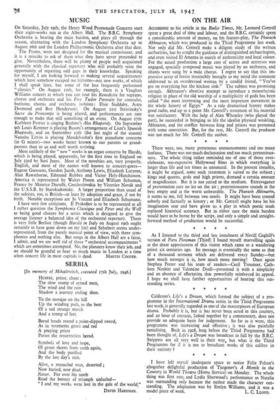ACCORDING to his article in the Radio Times, Mr. Leonard
Cottrell spent a great deal of time and labour, and the B.B.C. certainly spent a considerable amount of money, on his feature-play, The Pharaoh Akhnaton, which was produced in the Third Programme last week. Not only did Mr. Cottrell make a diligent study of the written authorities, but he sought the guidance of distinguished archaeologists, and even visited El Amarna in search of authenticity and local colour. For the actual production a large cast of actors and actresses was engaged, specially composed music was played by an orchestra, and chants were sung by a male chorus. I regret to say that this im- pressive array of forces irresistibly brought to my mind the comment addressed to an overdressed woman by a candid friend, " You've got on everything but the kitchen sink." The subject was promising enough. Akhnaton's abortive attempt to introduce a monotheistic religion in place of the old worship of a multiplicity of gods has been called " the most interesting and the most important movement in the whole history of Egypt." As a rule dramatised history makes good radio, and up to a point Mr. Cottrell's treatment of his material was satisfactory. With the help of Alan Wheatley (who played the part), he succeeded in bringing to life the idealist physical weakling, Akhnaton, and the conflict between king and priests was presented with some conviction. But, for the rest, Mr. Cottrell the producer was too much for Mr. Cottrell the author.
* * * *
There were, too, many' portentous announcements and too many fanfares. There was too much declamation and too much pretentious- ness. The whole thing rather reminded me of one of those over- elaborate, too-expensive Hollywood films in which everything is larger than life and ten times as unnatural. In the present instance, it might be argued, some such treatment is suited to the subject ; kings and queens, gods and high priests, demand a certain amount of magnificence. But it is not suited to the medium. Extravagance of presentation cuts no ice on the air ; pretentiousness sounds at the best empty and at the worst unbearable. The Pharaoh Akhnaton, it seems to me, fell between two stools. It might have been treated soberly and factually as history ; or Mr. Cottrell might have let his imagination soar and have given us a play in which poetic truth replaced historical accuracy. But in either case the main burden would have to be borne by the script, and only a simple and straight- forward method of production would be successful.
* * * * As I listened to the third and last instalment of Nevin Coghill's version of Piers Plowman (Third) I found myself marvelling again at the sheer appositeness of this vision which came to a wandering priest six centuries ago. Its message is essentially the same as that of a thousand sermons which are delivered every Sunday—but how much stronger it is, how much more moving! Once again Stephen Potter and his team of readers—Cecil Trouncer, Cath- leen Nesbitt and Valentine Dyall—presented it with a simplicity and an absence of affectation that powerfully reinforced its appeal. I hope we shall have further opportunities of hearing this out- standing series.
* * * *
Calderon's Life's a Dream, which formed the subject of a.pro- gramme in the International Drama series in the Third Programme last week, is generally regarded as one of the masterpieces of European drama. Probably it is, but it has never been acted in this country, and an hour of extracts, linked together by a commentary, does not provide an adequate b; lisis for judgement. So far as it went, this programme was interesting and effective ; it was also painfully tantalising. Back in 1928, long before the Third Programme had been thought of, Life's a Dream was broadcast in full by the B.B.C. Snippets are all very well in their way, but what is the Third Programme for if it is not to broadcast works of this calibre in their entirety ?
* * * * I have left myself inadequate space to notice Felix Felton's altogether delightful production of Turgenev's A Month in the Country in World Theatre (Home Service) on Monday. The whole thing was first rate, and Lydia Sherwood's performance as Natalia was outstanding only because the author made the character out- standing. The adaptation was by Emlyn Williams, and it was a
model piece of work. L. C. LLOYD.


































 Previous page
Previous page